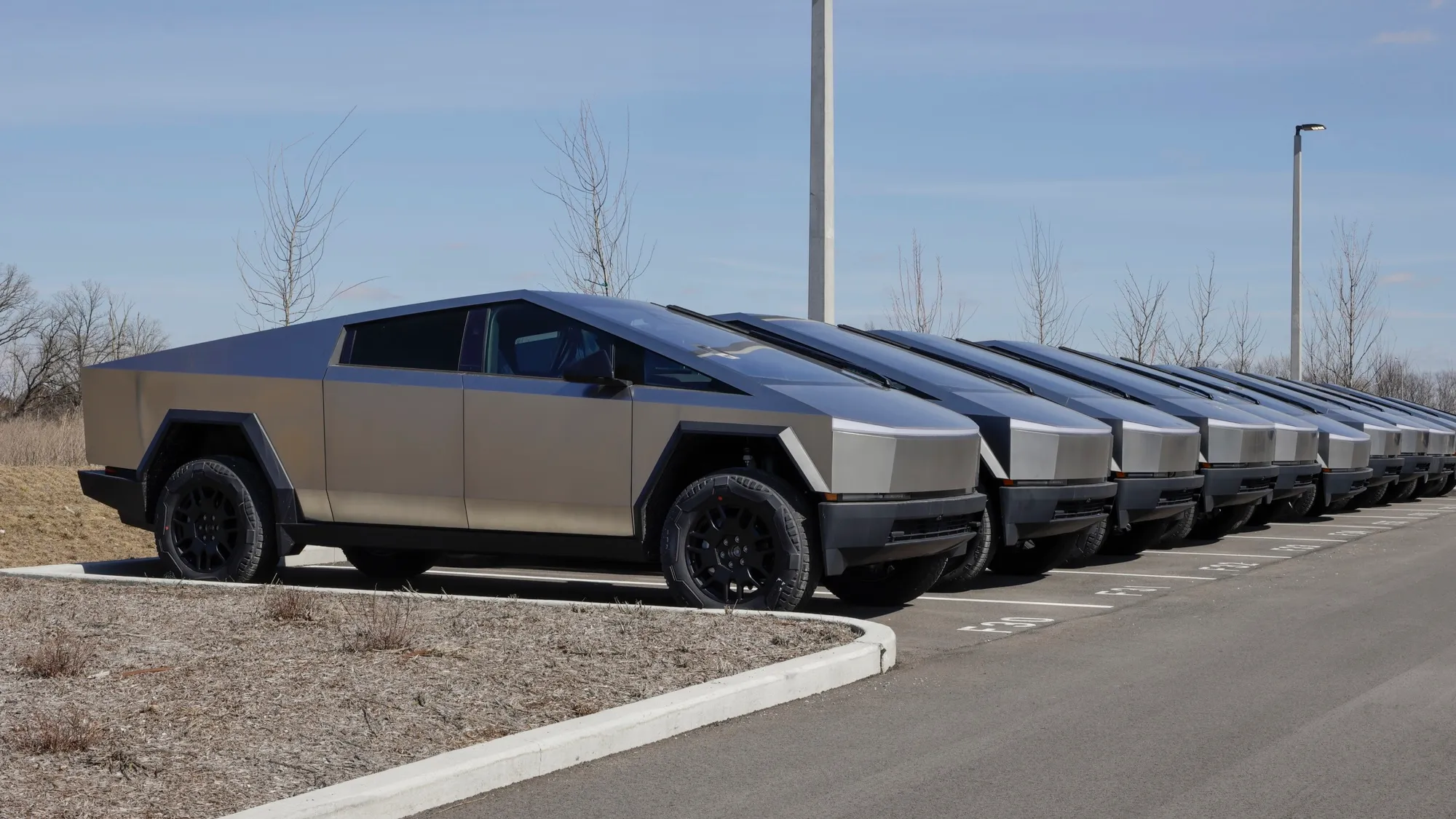
The Unraveling of Tesla: 46,000 Cybertrucks Recalled as Panels Literally Fall Off the Vehicle
Jump to:
Tesla’s recall of 46,000 Cybertrucks for detaching exterior panels marks the eighth recall for the model in just 15 months. As Elon Musk’s political involvement with Trump intensifies, Tesla faces not only engineering failures but an unprecedented consumer backlash, falling stock prices, and increasing competition that threatens the company’s future.
 |
The National Highway Traffic Safety Administration (NHTSA) announced on March 20, 2025, that Tesla is recalling virtually all Cybertrucks manufactured since the vehicle’s launch in November 2023. The issue centers on a stainless steel component called the “cant rail,” a decorative panel that runs alongside the windshield. According to Tesla’s filing with NHTSA, the adhesive used to bond the cant rail to the truck body can fail, particularly under environmental stress, allowing the panel to detach while the vehicle is in motion.
The consequence is potentially catastrophic: a sharp-edged stainless steel panel becoming a high-speed projectile on highways. While Tesla claims only about 1% of vehicles (roughly 460 trucks) are actually affected by the defect, the company is recalling all 46,096 Cybertrucks manufactured between November 13, 2023, and February 27, 2025, as a precautionary measure. Tesla has identified 151 warranty claims potentially related to the issue but maintains it is “not aware of any collisions, fatalities or injuries” resulting from the defect.
“If the cant rail stainless steel panel separates from the vehicle while in drive, it could create a road hazard for following motorists and increase their risk of injury or a collision,” Tesla wrote in its filing with regulators.
Tesla’s proposed fix involves replacing the cant rail assembly with a new design featuring a different adhesive “not prone to environmental embrittlement” and reinforced with welded studs. Owner notification letters are expected by May 19, 2025, with the company stating that drivers may continue to use their vehicles until parts become available in their region—a recommendation that has raised eyebrows among safety advocates.
Eight Recalls in Fifteen Months: A Pattern of Failure
The cant rail recall represents the eighth safety recall for the Cybertruck since deliveries began in late 2023, establishing a troubling pattern of quality control failures for a vehicle that costs between $80,000 and $100,000. Previous recalls have addressed issues with windshield wipers, display screens, acceleration pedals that can get stuck, power inverters that cause drive wheels to lose power, and now, basic structural components.
Videos circulating on social media in recent weeks show Cybertruck panels being ripped off with minimal effort, contradicting Tesla’s claims that the issues affect only a small percentage of vehicles. These viral demonstrations have fueled public ridicule of a vehicle once heralded as revolutionary but increasingly viewed as a triumph of style over substance and safety.
Manufacturing experts point to Tesla’s rush to market with the Cybertruck—after multiple delays—as a key factor in these recurring issues. The company’s emphasis on the vehicle’s unique aesthetic, particularly its unpainted stainless steel exterior, appears to have compromised fundamental engineering considerations and quality testing protocols that traditional automakers typically implement before mass production.
Cybertruck Recall TimelineDecember 2023: Windshield wiper malfunction |
Musk’s Political Entanglements Fuel Consumer Backlash
Beyond its technical defects, the Cybertruck has become a lightning rod for controversy due to CEO Elon Musk’s deepening alliance with President Donald Trump. Musk’s appointment to lead the administration’s “Department of Government Efficiency” (DOGE)—a team tasked with slashing federal spending—has dramatically reshaped Tesla’s brand perception and alienated much of its traditional customer base.
Once emblematic of environmental consciousness and technological innovation, Tesla vehicles are increasingly viewed by many former supporters as symbols of political polarization. Numerous Tesla owners have publicly announced their decisions to sell their vehicles in direct protest of Musk’s political activities and rhetoric, with social media campaigns encouraging others to do the same.
“Tesla used to be a symbol of the future,” one disillusioned owner wrote online, “but now it feels like it’s driving us into the past.”
This political realignment has had tangible consequences for Tesla’s market position. The company, which previously enjoyed strong bipartisan appeal, now faces resistance from the environmentally conscious, progressive customer base that fueled its early growth. Industry analysts note that this shift has been particularly damaging in coastal states where electric vehicle adoption is highest and where Tesla once dominated the market.
Violent Protests and Vandalism Escalate
More disturbing than consumer abandonment has been the rise in violent attacks targeting Tesla vehicles, dealerships, and charging infrastructure. Law enforcement agencies across the country have reported incidents ranging from vandalism to arson, with Tesla properties specifically targeted due to their association with Musk and, by extension, the Trump administration.
In Colorado, authorities recently charged a woman in connection with attacks on Tesla dealerships, including Molotov cocktails thrown at vehicles and “Nazi cars” spray-painted across a showroom. In South Carolina, federal agents arrested a man for allegedly setting fire to Tesla charging stations near Charleston, discovering writings critical of the government and DOGE in his possession.
These incidents represent extreme examples of a broader societal reaction to Musk’s political activities. Security experts suggest that Tesla’s distinctive and easily identifiable vehicles—particularly the angular, unmistakable Cybertruck—have become convenient targets for expressing political anger, creating unprecedented security challenges for both the company and its customers.
 Police inspect damage at a Tesla dealership following vandalism incidents. Attacks on Tesla properties have increased dramatically in 2025. |
Economic Fallout: Stock Collapse and Market Share Erosion
The combination of quality concerns, political controversy, and consumer backlash has devastated Tesla’s financial position. The company’s stock has plummeted approximately 40-50% since January 2025, erasing hundreds of billions in market capitalization. This decline far exceeds the performance of both the broader market and other major automakers during the same period.
Tesla also faces intensifying competition in the electric vehicle market, particularly from Chinese manufacturers offering increasingly sophisticated products at competitive prices. The uncertainty surrounding Trump’s aggressive tariff policies toward China, Mexico, and Canada has further complicated Tesla’s global manufacturing strategy and supply chain management.
Perhaps most concerning for investors is Tesla’s diminishing technological edge. The company recently announced delays to its promised battery technology improvements, now pushed to late 2025. These innovations were central to Tesla’s claims of maintaining a competitive advantage, and their postponement has further eroded confidence in the company’s future prospects.
The Road Ahead: Can Tesla Recover?
As Tesla owners await the cant rail repair process, the company faces existential questions about its direction and leadership. Industry observers are increasingly vocal about the disconnect between Musk’s political aspirations and his responsibilities as CEO of a public company. Shareholder activists have begun calling for governance changes, including a potential separation of the chairman and CEO roles.
For the Cybertruck specifically, the cumulative impact of eight recalls in fifteen months raises questions about the vehicle’s long-term viability. The model was meant to expand Tesla’s market reach into the lucrative pickup truck segment, but its repeated quality issues threaten to permanently damage its reputation among the pragmatic, reliability-focused consumers who dominate this market.
More broadly, Tesla’s trajectory from pioneering EV manufacturer to troubled enterprise serves as a cautionary tale about the risks of personality-driven corporate leadership. The company’s current struggles demonstrate how quickly brand equity can erode when product quality falters and leadership actions alienate core customers. Whether Tesla can address these fundamental challenges—and whether Musk is prepared to prioritize the company’s interests over his political ambitions—remains the central question for its future.
A Watershed Moment for Electric Vehicles
For the broader electric vehicle industry, Tesla’s troubles represent both a challenge and an opportunity. The company’s pioneering role in mainstreaming electric vehicles means its struggles risk undermining consumer confidence in the entire category. Conversely, Tesla’s missteps create openings for competitors with more reliable products and less controversial leadership to capture market share.
What is certain is that the cant rail recall, while technically fixable, represents a symbolic moment in Tesla’s evolution—the point at which the company’s image of revolutionary innovation gave way to a more complicated reality of manufacturing flaws, leadership controversies, and eroding public trust. For a company that once seemed to define the future of transportation, the challenge now is more fundamental: proving it can deliver basic quality and reliability in the present.
What are your thoughts on this issue? Join the conversation below.



